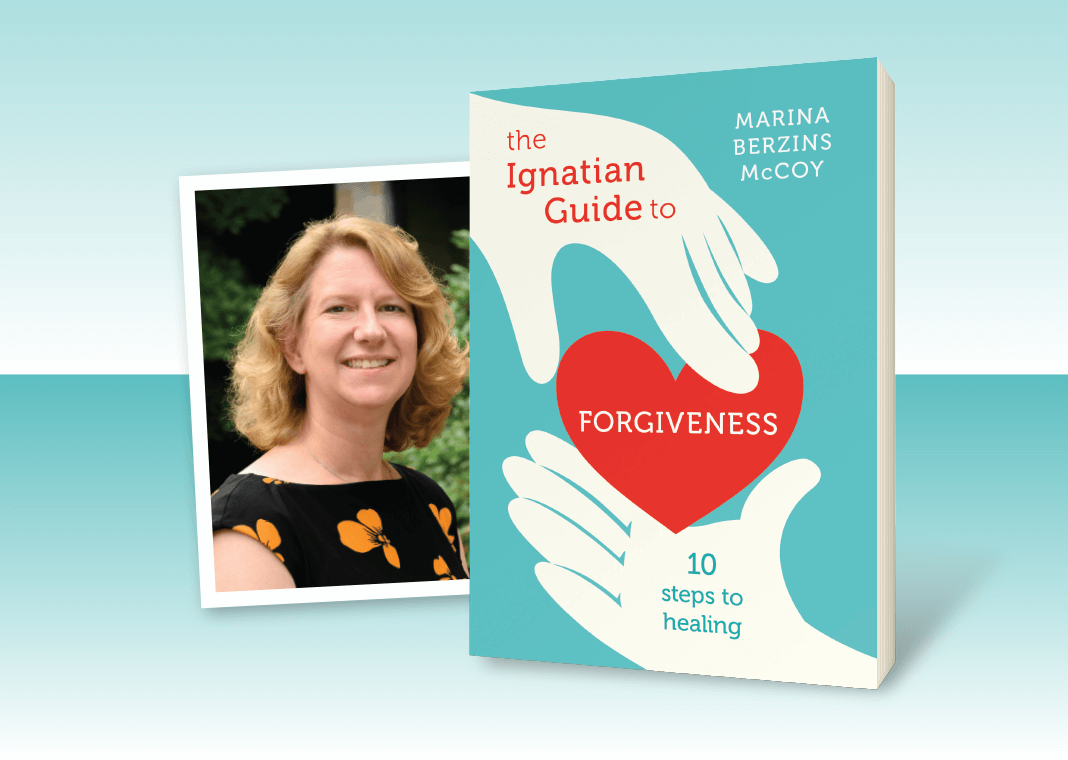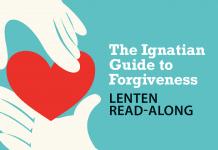Marina Berzins McCoy’s new book, The Ignatian Guide to Forgiveness, may be one of the best resources for spiritual health available to people who are wounded. I have read various books on forgiveness over the years (We always need help with that, don’t we?) and will probably continue reading books about it. We will need to keep reading about forgiveness and working on it, because it is not simple and the subject forces us to confront difficult truths. Just because Jesus tells us in no uncertain terms to forgive does not mean this is an easy command to obey. Actually, I don’t recall the Bible ever saying that it’s easy or simple to follow God’s way; I guess we superimpose our desires on Scripture in this and many other ways. We fret and fight the reality that forgiveness is complicated and difficult.
Forgiveness also messes with time, which is an aspect of forgiveness that Marina handles so well in her book.
One of the hardest truths about forgiveness is that the future after forgiveness often does not look much like anyone’s ideas about it. We might, for example, imagine that once forgiveness and reconciliation arrive, we will go back to some past time—perhaps real only in our fantasies. Alternatively, we may try to determine what the future looks like by placing restrictions on what forgiveness might look like or on what shape or form healing must have. Sometimes we have to let go of the past and let go of the future if we are to see where God is leading us in the present moment. (82)
Until we reconcile ourselves to the fact of spiritual timelessness, we will be consistently frustrated with not only forgiveness but also other facets of spiritual growth. With God, everything is present tense and eternal. Time does not put restrictions on the Holy Spirit, who works through our every experience of time: past, present, and future.
Also—and this is really important—Divine Love is not anxious about time. In fact, I suspect that Divine Love is never in a hurry either, because God holds everything in mercy, and the will of God’s love will never give up on us. So if it takes me a lifetime to recover from some horrible wrong done to me, God is not anxious over this. Nor does God condemn me for this slow unfolding. As long as I am working with the Holy Spirit and allowing love’s process to take place in me, Divine Love is pleased. God is not surprised by how slowly I progress or how easily I become tripped up or stuck. Love overcomes all of this.
God’s love works outside of space and time, which is good for us, because probably every person leaves this life with wounds unhealed and spiritual growth still in progress. Our life with God is not static but living and evolving—inside and outside of time—as we become more and more who God created us to become.
For me, learning to live in the present has also meant making friends with time. Part of me can still sometimes resist the very notion that the past is not subject to being relived and “done over” again, only this time without mistakes. . . . But while God gives us the gift of forgiveness, this does not come in the form of an infinite number of do-overs. Sometimes our spouses, friends, parents, and children do give us a real chance to try again, this time in the right way. When this happens, it is a great blessing. But we cannot always keep pushing the rewind button and trying again. For this we should be thankful; otherwise, life might never move forward at all! (85–86)
We need to forgive and be forgiven, because wrong has been done. We do damage, and that damage is not undone. Sin has its effects. Jesus returned in a resurrected body that still bore its scars. The wounds of his Crucifixion were not undone, and the wounds we cause or suffer are not undone either. But we continue our transformation anyway.
May we consider forgiveness an experience that is continuing and unlimited. Perhaps then we can be patient with it and yet never cease to engage with it.





Vinita,
Your words moved me deeply! Thank you for them!
Elizabeth
When I really dig deep into how events unfold, I almost always find I made decisions based on needfulness and or fear which positioned me in a place tangled with unrealistic expectations. Most of my pains these days are self inflicted as I now know all people fail, often and spectacularly; I try to love ’em anyway. I endeavor to be out of the forgiveness business altogether. My approach is now one of being willing to pay attention to my attachments, wherein I again find needs which others, even those in the past, could not have possibly met. The Father meets my needs, people are opportunity to express his Love, even if from afar…hehehe…
Profound insights. Thanks Vinita. Forgiveness is indeed ongoing. Seventy times seven – makes sense.
I think I need to read this about 10 more times today, and probably every day after. Thank you!
These are such beautiful thoughts on forgiveness, they are a true gift – thank you Marina and Vinta!
The insights about the concept of ” God’s time” or timelessness, and how forgiveness presents a “new” reality in relationship and not merely a “reset to where things were” – are profound.
The healing mystery of forgiveness which accompanies each sunrise and sunset presents the opportunity for genuine spiritual freedom and communion with loved ones and strangers alike.
In writing my current spiritual journal reflections, today’s writings brought me back to an indelible moment in time as a young boy when I first heard God’s guiding voice about the healing power of forgiveness which has been a spiritual North Star ever since. It was the compassionate and patient voice of my mother talking to her fourth of nine children. Thank you Loretta.
Profound thoughts on forgiveness by both Marina and Vinita. Forgiveness is complicated and difficult and is a process. Loving God means taking on difficulties and relying on love, the love of the Trinity. I’m not sure we can ‘choose’ to forgive and it’s not about being a certain ‘type’ of person. It is an unfolding which continues.